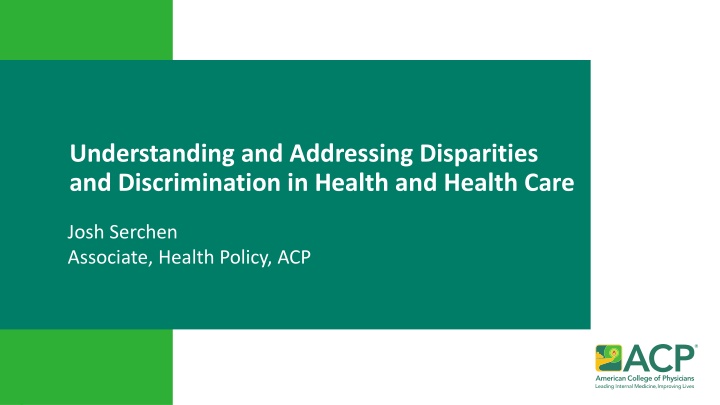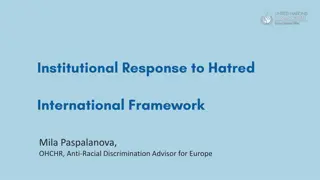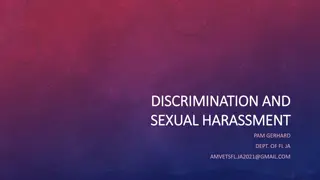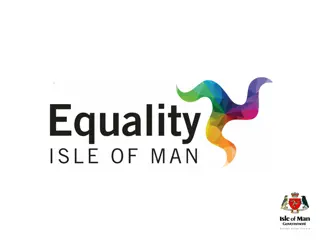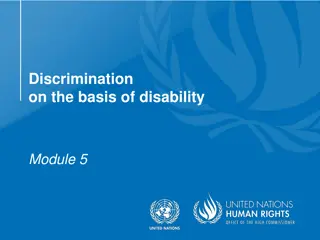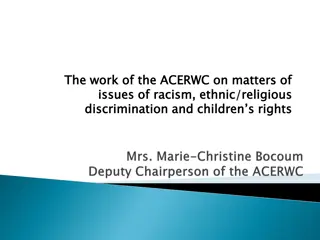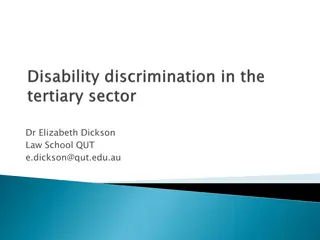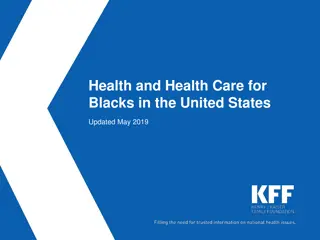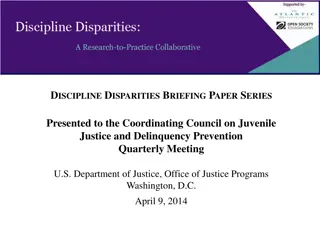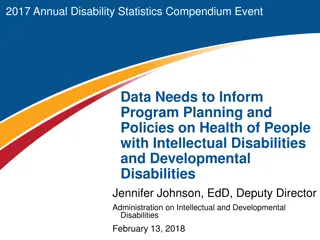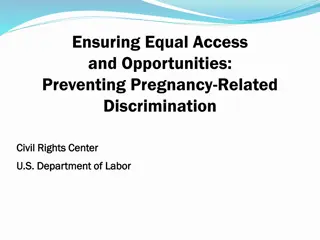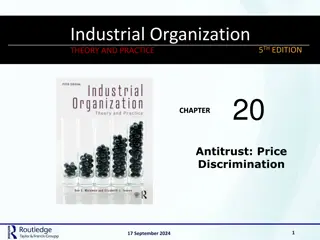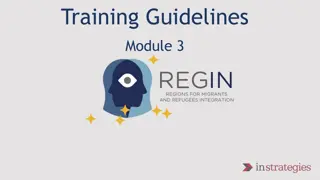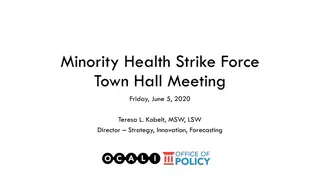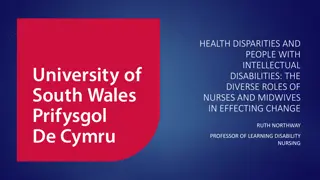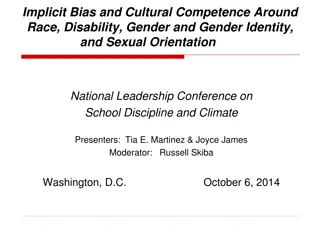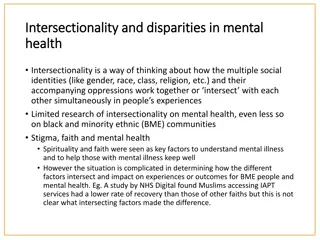Disparities and Discrimination in Health and Education
Addressing disparities and discrimination in health care and education is crucial for promoting equitable access and outcomes. This comprehensive policy framework emphasizes social determinants of health, racism, economic disadvantages, and education quality. It calls for implementing strategies to eliminate discrimination in the physician workforce, improve minority representation, and ensure equitable access to education resources.
Download Presentation

Please find below an Image/Link to download the presentation.
The content on the website is provided AS IS for your information and personal use only. It may not be sold, licensed, or shared on other websites without obtaining consent from the author.If you encounter any issues during the download, it is possible that the publisher has removed the file from their server.
You are allowed to download the files provided on this website for personal or commercial use, subject to the condition that they are used lawfully. All files are the property of their respective owners.
The content on the website is provided AS IS for your information and personal use only. It may not be sold, licensed, or shared on other websites without obtaining consent from the author.
E N D
Presentation Transcript
Understanding and Addressing Disparities and Discrimination in Health and Health Care Josh Serchen Associate, Health Policy, ACP
Disparities in Health and Health Care Source: COVID Tracking Project, The Atlantic 2
A Comprehensive Policy Framework to Understand and Address Disparities and Discrimination in Health and Health Care ACP believes in good health care for all, poor health care for none Social determinants of health, racism and discrimination, economic and educational disadvantages, health care access and quality, individual behavior, and biology, affect a person's health We must recognize and confront the fact that many elements of U.S. society, some of which are intertwined and compounding, contribute to poorer health outcomes. If we accept that no one element of society is solely responsible for creating disparities, then any strategy to eliminate disparities that addresses any element independently of the others will fail to accomplish its goal. 3
Understanding and Addressing Disparities and Discrimination In Education and in the Physician Workforce Disparities in medical education and the health workforce Implement policies to eliminate discrimination experienced by health care professionals Respect and dignity; opportunities for leadership, mentorship, and advancement; interventions to prevent, report, and address incidents of harassment Implement best practices in the recruitment, retention, and advancement of marginalized health professionals Expand outreach programs, diversity/minority affairs offices, scholarships, and other financial aid programs to improve matriculation/graduation rates of minority medical students Disparities in education at all levels Sufficiently fund schools and implement best practices to strengthen educational quality and results Replace biased and inequitable funding mechanisms built upon underlying structural factors like segregation and racial wealth gaps, which result in education resource disparities Ensure equitable access to high-quality teachers, a rigorous evidence-based curriculum, extracurricular activities, and educational materials and opportunities 4
Understanding and Addressing Disparities and Discrimination Affecting the Health and Health Care of Persons and Populations at Highest Risk Indigenous Health Coverage, Quality, Access Maternal Mortality Health Literacy COVID-19 equitably fund IHS/tribal health systems access to comprehensive coverage across a woman s lifespan single payer or public choice model interventions/ practice adaptations to accommodate patient cultural, informational, and linguistic needs high-quality granular data equitably distribute testing, treatment, vaccines, and other resources interventions: evidence-based, culturally appropriate, community accepted, and respectful of traditional beliefs expand Medicaid eligibility maternal mortality review committees expand ACA insurance marketplace subsidies cover and reimburse translation services safety and quality improvement activities stronger workplace protections increase number of health care professionals in underserved communities social drivers, mental health, suicide interventions universal access to family and medical leave supporting patient navigators doulas and patient navigators 5
Understanding and Addressing Disparities and Discrimination in Law Enforcement and Criminal Justice Affecting the Health of At-Risk Persons and Populations Study, implement, and fund alternative models that deploy social workers and other mental health professionals specially trained in violence interruption, mediation, homelessness outreach, and mental health Additional funding and resources should be invested in addressing socioeconomic factors that are associated with crime, such as unemployment, homelessness, education Policies should be implemented to address the disproportional impact of incarceration on health at the personal, familial, and community levels for people of color, as well as disparities in rates of law enforcement interactions, incarceration, and severity in sentencing Criminal justice law, policies, and practices, should be examined and studied for racial impact and overhauled if they result in unnecessary or disproportionate harm 6
Biden Administration Executive Actions Executive Order On Advancing Racial Equity and Support for Underserved Communities Through the Federal Government recommended policies ACP: Consistent with ACP s policies to address disparities in discrimination in health and health care, this executive order seeks to advance principles, policies, and approaches to achieving equity across the federal government, including requiring federal agencies to review agency programs and policies to assess systemic barriers in accessing benefits and opportunities for marginalized and underserved communities; consider whether new regulations may be needed to advance equity in these programs; and direct resources towards underserved communities. Also as recommended by ACP, this Executive Order revokes Executive Order 13950 issued by the previous administration, which prohibited federal agencies and contractors from offering or supporting certain forms of implicit bias training. 7
Biden Administration Executive Actions Executive Order on Ensuring an Equitable Pandemic Response and Recovery ACP: The COVID-19 pandemic has disproportionately impacted communities of color. This executive order will advance ACP s call for equitable support for those communities, and for addressing the social drivers of health that can exacerbate COVID-19. call Memorandum on Redressing Our Nation s and the Federal Government s History of Discriminatory Housing Practices and Policies ACP: Today s announcements from President Biden order the Department of Housing and Urban Development to work on inequality in housing. The interconnected nature of things like issues with housing and other social drivers of health, cause widespread and pervasive disparities. 8
Biden Administration Executive Actions Memorandum on Tribal Consultation and Strengthening Nation-to-Nation Relationships ACP: The actions direct agencies to respect tribal sovereignty, empower tribal self-determination, and strengthen relationships with American Indian and Alaska Native tribes. In a recent policy paper, ACP observed that public policy must acknowledge the long history of racism, discrimination, abuse, forced relocation, and other injustices experienced by Indigenous persons and commit to focused and culturally appropriate policies to address their present reality of injustice, disparities, and inequities. Memorandum Condemning and Combating Racism, Xenophobia, and Intolerance Against Asian Americans and Pacific Islanders in the United States ACP: The announcements also disavowed discrimination against and harassment of Asian Americans, which ACP condemned in a statement issued last March, based on reports of reports of harassment against individuals of Asian descent, including physicians and other clinicians. At this challenging time our focus should be on respecting the dignity of others. We cannot allow prejudice and discrimination to divide us. condemned 9
Questions? A Comprehensive Policy Framework to Understand and Address Disparities and Discrimination in Health and Health Care Understanding and Addressing Disparities and Discrimination in Education and in the Physician Workforce Understanding and Addressing Disparities and Discrimination Affecting the Health and Health Care of Persons and Populations at Highest Risk Understanding and Addressing Disparities and Discrimination in Law Enforcement and Criminal Justice Affecting the Health of At-Risk Persons and Populations 10
